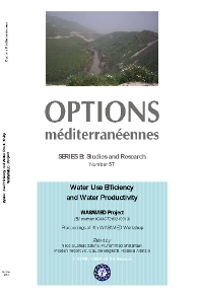| Article précédent | p. 163-174 | Article suivant |
Irrigation research results in the Syrian Arab Republic
Low-efficient traditional surface irrigation prevails over more than 80 percent of irrigated area in Syria, resulting in a loss of more than 50 percent of available water resources at a time these resources are facing growing pressure from all sectors. Accordingly, the Syrian government accorded an increasing consideration to the implementation of water research programme applicable for most strategic crops and farming, aiming at improving on-farm water management and, consequently, improving WUE and reduction of water loss in agricultural sector. Research and technical results showed that the use of modern irrigation methods on cotton, for example, leads to irrigation water saving by 41 percent as compared to traditional irrigation, average yield 30 percent, and improvement of WUE from 0.23 to 0.53 kg/m3. In economic point of view, modern irrigation methods were superior to traditional irrigation, and drip irrigation ranked the first in terms of revenues and net profits per unit area. Depending on technical and economic results of modern irrigation methods the government made several decisions for transferring to modern irrigation. Areas transferred to modern irrigation are estimated to 260 thousand ha during the period 2000-2004.
- [ Afficher ]
- [ Télécharger ]
- [ Exporter la citation ]
Vous pouvez télécharger la citation au format :
- [ Imprimer ]
-
Mots-clés
ANALYSE ECONOMIQUE, EFFICACITE, METHODE D'IRRIGATION, SYRIE, UTILISATION DE L'EAUCiter cet article
Kaisi A., Mohammad Y., Mahrouseh Y. Irrigation research results in the Syrian Arab Republic. In : Lamaddalena N. (ed.), Shatanawi M. (ed.), Todorovic M. (ed.), Bogliotti C. (ed.), Albrizio R. (ed.). Water use efficiency and water productivity: WASAMED project. Bari : CIHEAM, 2007. p. 163-174. (Options Méditerranéennes : Série B. Etudes et Recherches; n. 57). 4. WASAMED (WAter SAving in MEDiterranean agriculture) Workshop, 2005/09/30-2005/10/04, Amman (Jordan). http://om.ciheam.org/om/pdf/b57/00800785.pdf



